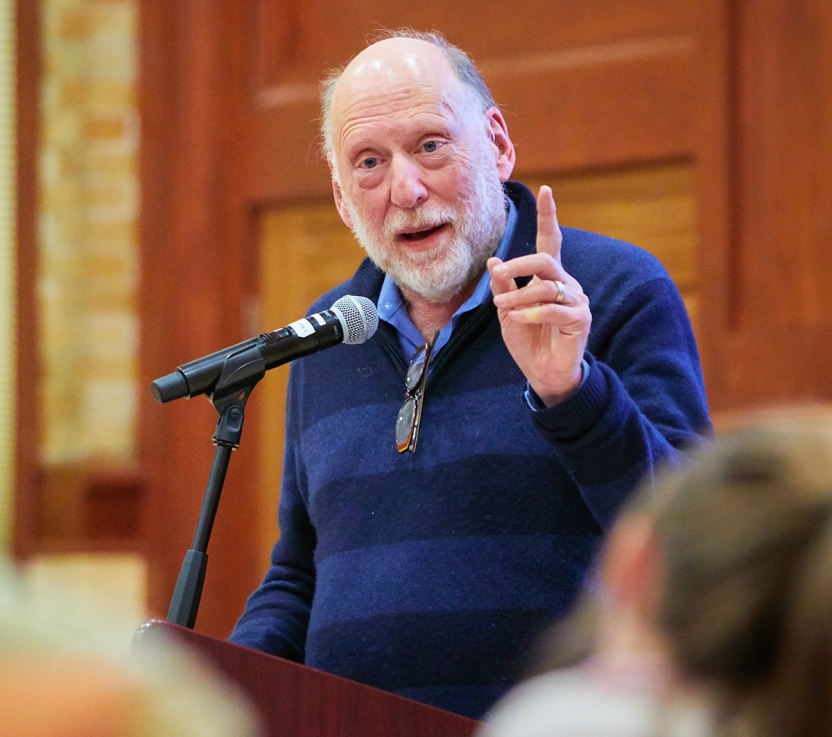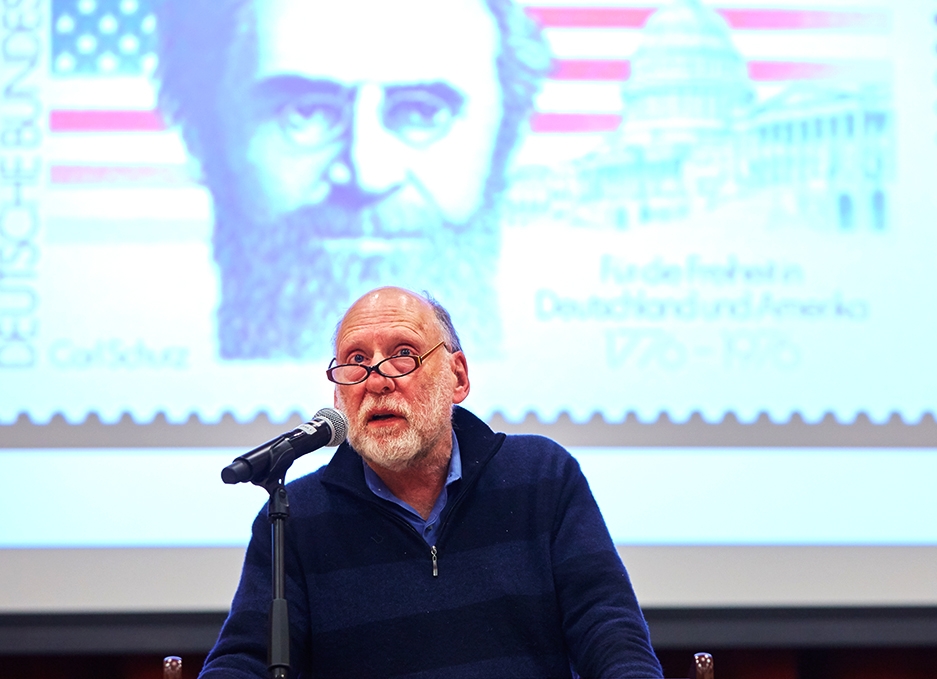Scholars Examine Significance of 1968 at Annual Rohatyn Conference

MIDDLEBURY, Vt. – Of all the turbulent years and events that made up the 1960s, one year in particular—1968—stands out for its dizzying degree of social and cultural upheaval. The events of that year provided a focus for the sixth annual International and Interdisciplinary Conference, “1968, Fifty Years of Struggle,” sponsored by the Rohatyn Center for Global Studies. The conference ran from March 8–10, drawing presenting scholars from more than a dozen colleges and universities, including Middlebury.
In Wilson Hall, as the Beatles’ “Revolution” faded from the sound system, Tamar Meyer, Robert R. Churchill Professor of Geosciences and director of the Rohatyn Center, set the stage for the three-day event. “Scholars assembled here will explore the hopes that the year 1968 brought and the revolution that never really came to fruition,” she said.
Mayer said 1968 is notable as the decade’s “watershed because it was there that the optimistic and destructive trajectories of the entire period intersected most dramatically.
“The scholars will address how authority, legitimacy, and power were exercised and challenged in the political, economic, social, and cultural realms, and will offer their thoughts about what we can learn from 1968 now, 50 years later.”
Mayer introduced the conference’s keynote speaker, the American writer and sociologist Todd Gitlin of the Columbia University School of Journalism, who gave a talk titled “The Ambiguous Consequences of Failed Revolutions.” With evocative imagery projected behind him, Gitlin noted some of the myriad critical events of 1968:
- The assassinations of Martin Luther King Jr. and Robert F. Kennedy
- The My Lai massacre and Tet Offensive in Vietnam
- The death of thousands of American soldiers and countless Vietnamese as a result of the war
- President Lyndon Johnson’s decision not to run for a second term, and Eugene McCarthy and George Wallace’s consequential entry in the race
- The violence surrounding the Democratic Convention in Chicago
- The election of Richard Nixon
- The growth of the civil rights, women’s rights, Black Panthers, and other movements in the country

American sociologist, political writer, novelist, and cultural commentator Todd Gitlin gave the keynote address at the 2018 International and Interdisciplinary Conference: “1968, 50 Years of Struggle.”
“Now, from a distance of half a century, it’s the whole crazy amalgam, the wildness, the sense of looming apocalypse and possibility that’s so startling and hard to make sense of,” Gitlin said. “It’s the sheer surprise, the courage and recklessness. The moral passion and delusion and often plain inchoateness.
“One thing you can say [about 1968] is that the world was not frozen. Nothing could be taken for granted. Traditions were shredded. Public and private worlds were opened. All kinds of cooperation might be possible. Sweep away the old; let the repressed return.”
The “grand illusion” of all these movements, Gitlin said, was that, because they were in motion, they were in command of history. “Backlash happened. Richard Nixon was elected president. Enough antiwar Democrats refrained from voting or voted for fringe ticket [candidates] to escort Nixon into the White House.”
The grim result, Gitlin noted, was seven more years of war, eventually ended by congressional legislation, but only after 58,000 Americans and several million Vietnamese, Cambodians, and Laotians died.
For his audience of more than 100 students, faculty, and members of the Middlebury community, the guest speaker pointed to five lessons from the events of 1968.
First, movements run out of steam, and energy over time dissipates. Second, when a movement assaults authority but fails to be organized to govern, then “someone else will come along and pick up the pieces.” Third, movements leave residue behind; for example, “White wealth still overwhelms black wealth” in America. Fourth, history offers no guarantee of moral progress. And fifth, “no victories are final, and neither are defeats.”
Gitlin, who was a student at Berkeley and Harvard in the 1960s and was the third president of the antiwar group Students for a Democratic Society, then projected Walt Whitman’s poem “To a Foil’d European Revolutionaire” on the screen behind him in Wilson Hall. He read the entire poem aloud and asked: “What was the significance of 1968?”
“It’s up to us,” he answered.
Two Middlebury faculty members, Stephen Donadio and Linus Owens, opened the presentation sessions of the conference later that evening at the Robert A. Jones ’59 House. Donadio, the Fulton Professor of Humanities and director of the Program in Literary Studies, presented “Black Power at Columbia, 1968.” At that time, Donadio was an instructor at Columbia, where he witnessed firsthand the developments that brought the university to a standstill, and at that time published personal interviews with leaders representing principal groups involved in the general protest.
Owens, an associate professor of sociology who studies political protest including urban squatting movements and student activism, looked at what the protests at Columbia and San Francisco State College in 1968 may suggest about today’s student protests.
The conference was organized by Tamar Mayer, Robert R. Churchill Professor of Geosciences and director of the Rohatyn Center for Global Affairs; Edward Vazquez, associate professor of history of art and architecture; and Mark Williams, professor of political science, with the support of 11 academic departments and programs. A full list of presenters is available at the Rohatyn Center for Global Affairs.

